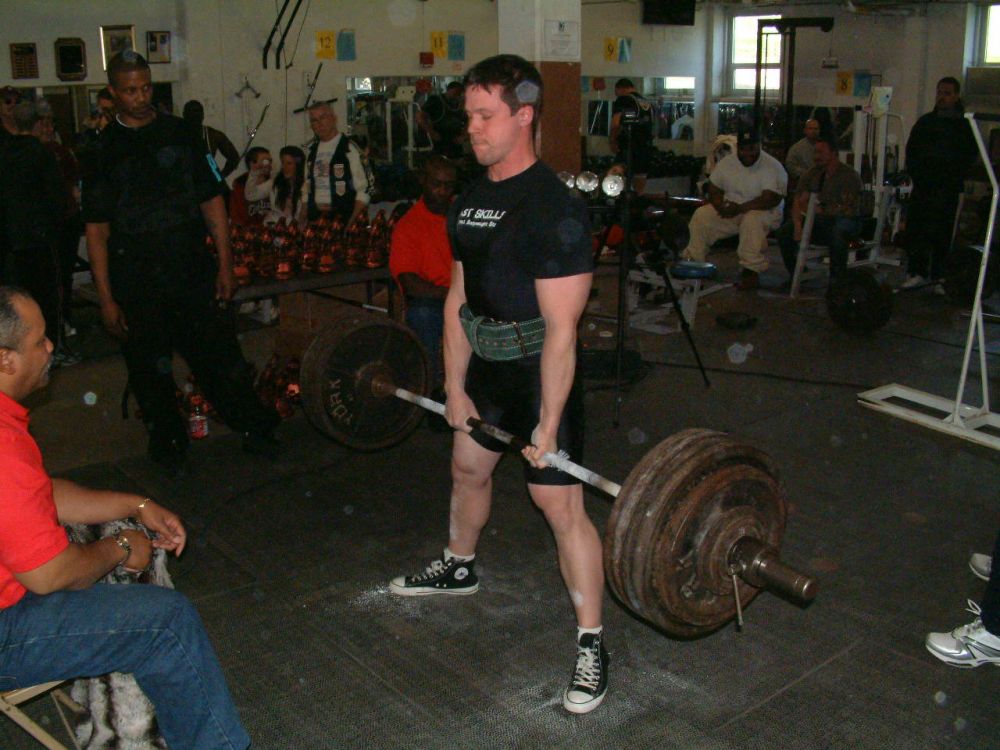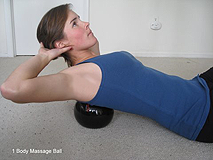Things I Learned in 2010
As another year passes, I like to step back, sit down, and think about all the things I’ve learned. 2010 was a good year – I hit some long term lifting goals in the bench, squat, and deadlift, remained relatively injury free, and met a lot of cool people in my travels. In the end, what else can you ask for?
So without further adieu, my thoughts and reflections on the year…
1. Competition is good.
I got on a bit of a competition kick early this year – jumping in a powerlifting meet, an Olympic lifting meet, and even a CrossFit competition. I’ve always believed that one good way of focusing your training is to follow a well-established lifting program. The other way is to compete.

(500 lbs – at Dumbarton Middle School, the gym where I first picked up a weight)
If you enter a competition, you have a set timeline for a goal. Your training now has to focus on that goal. A powerlifting meet requires you to work your big lifts; an olympic meet on the horizon and you’ll definitely spend more time on the quick lifts; a CrossFit competition on the calendar and you better believe that conditioning starts taking top priority in your training.
Low and behold, you’ll find yourself getting better at that area of fitness. Which brings me to my next point…
2. If you want to get good at something, do it.
This seems too simple, right? I got this advice from Coach Wilkes at an Olympic Lifting seminar this past summer. If you have a chance to attend one of his seminars, do it (his site – http://www.crossfitchesapeake.com/). He is a phenomenal coach who explains his technique very well. The proof of his expertise is clearly demonstrated by any one of his sons, all amazing lifters – (http://www.youtube.com/watch?v=zb_PXWry2A0)
Anyway at the seminar he simply said, “If you want to get good at the Olympic lifts, then you have to do them regularly.” Again, too simple to be useful, right? But how many of us wish we were better at X,Y, or Z, yet don’t really put the time in? This might be an indication that we are trying to do too much at once and we need to simplify and focus our training. (more on that later)
After the Olympic seminar, I went on a several month stretch of focused Olympic lifting training. It was my top concern for every single workout. I added 10 kg onto my best snatch (while greatly improving my technique), and 17 kg onto my best clean and jerk.
I now look at goals I have, and whether I’m putting the necessary time in for each one. You can’t get better at something if you don’t do it. So what if I’ve got too many goals and never seem to work on some?….
3. Look to simplify.
I think this is good advice in many areas. Everytime I felt overwhelmed in my training or life this year, I looked at what I could remove. Too many times we look at what we can add to our lives and our training in an attempt to make it better – I’m guilty of this myself.
I always try to read and learn each year. I attend seminars and talk to other professionals. But in this quest for knowledge, sometimes we need to stop and look at whether we’re actually applying what we know, or do we just enjoy that process of gathering information.
Know when to gather information, but also know when to step back and simplify. You’ll find yourself keeping only the most important and effective pieces of information.
Of course any knowledge is worthless without action, so that leads me to my next point…
4. Work on changing your behaviors to reach your goals.
No matter what goal you have in life, whether it be fitness-related or not, you need to take action in order to accomplish it. In order to take action, you need to align your behaviors so that it becomes easier and easier to reach your goal.
An example – I wanted to improve my grip strength, but kept all my grippers at home. I kept telling myself that I’d work on closing my grippers at home, or after I got back from a workout. But the reality is that I never felt I had the time and was hardly using my grippers at all. The solution? I simply put my grippers in my gym bag and now work with them between sets of squats. Now grip work is “easy” to get in, and I’m seeing marked improvement again (getting dangerously close to closing a #3).
I use that gripper example because working toward my goal didn’t require any additional money, investment, or knowledge. A lot of us, myself included, tend to think that if we just had this piece of equipment, or that bit of knowledge, then we would finally reach our goals. So many fitness and non-fitness products are sold on that premise of untapped potential (think of the Container Store which sells the potential to be organized.)
Is that really your limiting factor? That you don’t have something? Or are you just not using what you have?
People have been getting freakishly strong and reaching unbelievable goals with a fraction of the knowledge and equipment we have today. It’s about actually applying what we have that lets us reach our goals. Are you actually applying what you know? If not, then you have to change your behaviors (your internal self), before looking for external things to add. This goes hand in hand with simplifying your training, as it becomes easier to focus on changing one or two behaviors when you cut away the rest.
I’m not even scratching the surface of modifying your behavior, as I myself have a lot to learn, but I want you to start considering it in your own training. What behaviors can you change to make success an automatic outcome?
5. Try Something New.
I always make it a habit of heading to various seminars and reading various books throughout the year. But I fall into the trap that many fall into whereas I only read books that I agree with, and go to seminars of strength experts whose material I already know.
Well, I went to a seminar this year on yoga and recovery techniques. Specifically it centered around using this ball.

Now, a good friend of mine, Mike Choi, had been carrying this ball around the gym with him for months. I hadn’t had a chance to really use it, but I figured how effective could this thing be? I mean, it looks like a kid’s playtoy, surely it’s not going to be helpful to me?
At the seminar I dug around my sides and armpits. I found some very, very tender spots that I definitely couldn’t hit with a foam roller. A test of my overhead range of motion before and after this rolling was jaw-dropping. My shoulders opened up unbelievably well. I haven’t had that reaction since I got ART massage a couple years ago. It was that good.
I used the massage ball on a couple clients with similarly spectacular results. And what does increased overhead range of motion mean, besides injury prevention? How about a better handstand! One of my clients improved so much after 5 minutes of rolling that the improvement on his one arm handstand was miraculous.
But back to my point, this was not a seminar that I’d check out on first look. A yoga recovery workshop centered around rubber balls? I went to a seminar with Mark Rippetoe and Jim Wendler this year! What could I learn from this? Well, the answer is a whole hell of a lot.
In addition to this new discovery, my training also took several turns throughout the year as I tried new things. As I mentioned, I went from powerlifting to CrossFit to Olympic lifting, and over the last several months I’ve been working on a bodybuilding routine (and need to buy new shirts now!!).
I’ve purposely done this moving around to get a better idea of these various areas of training firsthand. “Walk a mile in another man’s shoes” sort of thing. Of course, I don’t expect my power lifts to improve if I’m not working on them (although I did PR in a couple these past couple months), and I don’t expect my Olympic lifts to improve if they take a sideline (although they’ve maintained very well), but across your whole training career, what’s a few months of playing around in another discipline?
In a seminar at Wichita Falls, Jim Wendler kept mentioning that we should keep our long term training career in mind. That things take time to develop (no “5 minute abs” and “improve your bench in 10 days!”). I think a lot of people would be terrified to take a month or two doing something else (or even taking time completely off). But how much time is 2 or 3 months if you’re training life is 10, 20 or 30+ years?
Well, that’s some thoughts and highlights from the year. The more I learn, the more I realize how much I don’t know. Or to quote some young punks – “All I know is that I don’t know nothing . . . and that’s fine.”
So what have you learned? Leave a comment!

